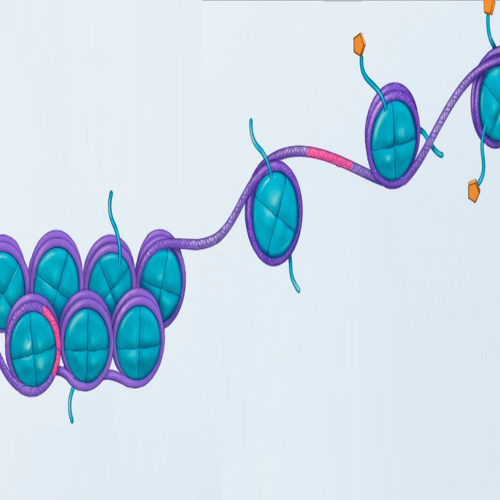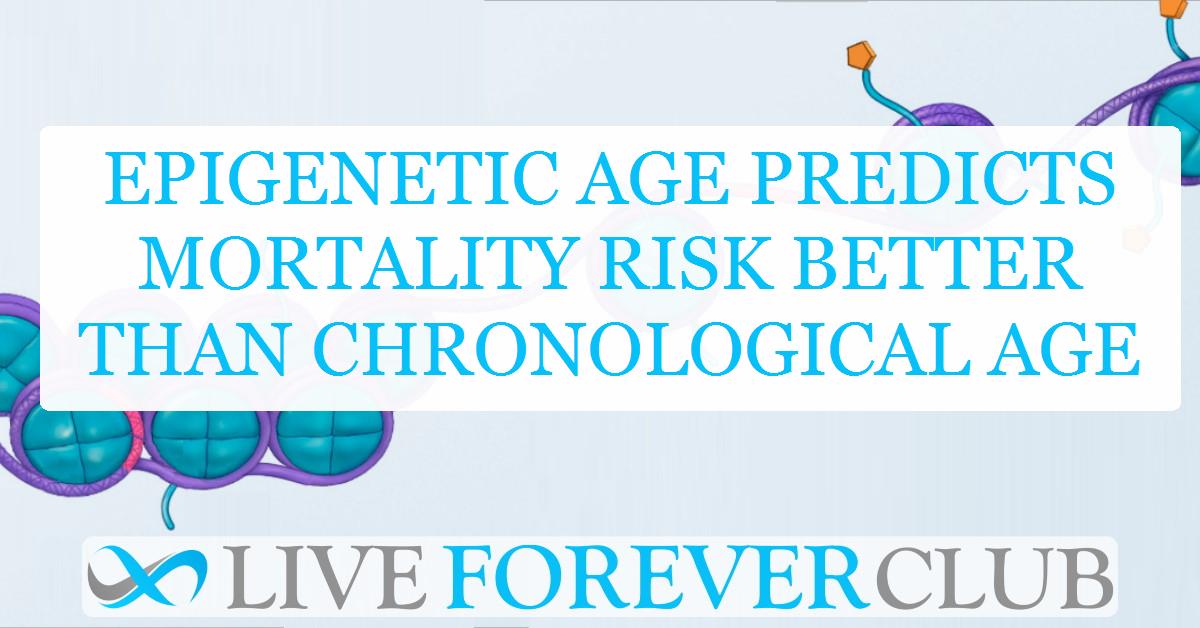In recent years, researchers have been exploring the boundaries of biological ageing. Unlike the traditional view that ageing is solely based on chronological age, a novel concept known as "epigenetic age" has been emerging as a promising measure. Epigenetic age, which focuses on changes in the chemical modifications of DNA, might hold the key to understanding how fast or slow an individual is ageing biologically.
The study by Tesfaye B. Mersha from University of Cincinnati, titled "Epigenetic Age Acceleration and Mortality Risk Prediction in U.S. Adults", delves into this fascinating topic, exploring how differences in epigenetic age predict various forms of mortality.
What is Epigenetic Age Acceleration?
Epigenetic age refers to the biological age of a person, estimated through epigenetic markers on their DNA.
Unlike chronological age, which is simply the number of years since birth, epigenetic age takes into account biological processes and the cumulative effects of environmental and lifestyle factors. Researchers use "epigenetic clocks," mathematical models based on specific DNA methylation patterns, to estimate this biological age.
"Epigenetic age acceleration" (EAA) occurs when the epigenetic clock predicts that someone is older than their chronological age. This phenomenon is often linked with a greater risk of various age-related diseases and overall mortality. Mendy and Mersha's research sought to determine whether different epigenetic clocks could predict mortality among a U.S. adult population sample and, if so, how effectively they could do it.
Methodology Behind the Study
The authors analysed data from 2,105 adults who participated in the 1999-2002 National Health and Nutrition Examination Survey (NHANES), who were then followed for their mortality outcomes until 2019. Participants were 50 years or older, and data were collected on several potential covariates, including age, gender, race, income, and health-related factors such as smoking history, body mass index (BMI), and pre-existing health conditions like asthma or diabetes.
Epigenetic age was determined using nine different epigenetic clocks, including the well-known Horvath, Hannum, GrimAge, PhenoAge, and others. Each clock takes into account different DNA methylation sites, which are essentially "tags" on the DNA that can activate or silence certain genes. These clocks can help provide insights into biological ageing, longevity, and even the potential impact of lifestyle factors on health.
Key Findings
One of the most striking results from the study is that different epigenetic clocks have varying levels of predictive power for overall, cardiovascular, and cancer mortality:
Overall Mortality: Several epigenetic clocks, including Horvath, Hannum, PhenoAge, Vidal-Bralo, and GrimAge, significantly predicted overall mortality. Among these, the GrimAge clock emerged as the most powerful predictor. Specifically, each five-year increase in GrimAge acceleration was associated with a 50% increase in the risk of overall mortality.
Cardiovascular Mortality: When it came to cardiovascular deaths, GrimAge again stood out as the most significant predictor. A higher GrimAge score was associated with a 55% increased risk of dying from cardiovascular diseases. Notably, other clocks, such as Horvath and Hannum, did not show a statistically significant association with cardiovascular mortality.
Cancer Mortality: Horvath, Hannum, and GrimAge clocks were all significant predictors of cancer mortality. Interestingly, the ability of these clocks to predict cancer-related deaths highlights that different biological pathways and processes might be at play in different types of mortality.
The study also analysed a relatively new measure called DunedinPoAm, which estimates the pace of ageing. The DunedinPoAm was significantly associated with both overall and cardiovascular mortality but did not show a significant association with cancer mortality.
What Do These Findings Mean?
The findings of Mersha's study provide a valuable insight into how biological ageing impacts mortality risk. The fact that epigenetic clocks can predict mortality suggests that these clocks are capturing crucial information about our health that goes beyond our chronological age.
Biological Age Matters More Than Chronological Age
By showing that individuals with higher epigenetic age acceleration are at a greater risk of dying earlier, the study emphasises the importance of biological age. This has implications for healthcare because measuring epigenetic age could help identify people at higher risk of age-related diseases even if they are relatively young in years.
GrimAge as a Strong Predictor
GrimAge emerged as the best predictor of mortality, especially for cardiovascular deaths. This epigenetic clock was developed to include methylation markers that relate not only to age but also to lifestyle and health-related factors, which might explain why it performs so well. It incorporates biomarkers like smoking pack-years and plasma proteins associated with mortality, making it a robust predictor.
Impact on Public Health and Preventive Measures
If healthcare providers can measure biological age using these epigenetic clocks, it may enable early interventions for individuals who are ageing faster biologically. For instance, lifestyle modifications such as diet, exercise, or managing stress could potentially slow down epigenetic age and reduce mortality risk.
Epigenetics and Lifestyle: What Can We Learn?
The implications of this research go beyond mortality prediction. Epigenetic age is influenced by many factors, including lifestyle, environment, and even socioeconomic conditions. Understanding the connection between epigenetic ageing and lifestyle can help individuals take meaningful actions to potentially decelerate their biological clock.
Smoking and Epigenetic Ageing
GrimAge includes a smoking component, which means that smoking directly affects epigenetic ageing. The association between higher GrimAge and increased mortality risk supports a growing body of evidence that smoking accelerates biological ageing. Quitting smoking, therefore, could potentially reduce the acceleration of epigenetic age and improve health outcomes.
Exercise and Biological Ageing
Physical activity has long been known to provide numerous health benefits, and it may also slow down epigenetic ageing. Previous studies have indicated that regular exercise is associated with lower epigenetic age acceleration, possibly reducing the risk of age-related diseases and mortality. The current study's findings emphasise the need for maintaining an active lifestyle to mitigate biological ageing.
Diet and Nutrition
While the study did not directly address diet, the role of diet in influencing biological age is undeniable. Diets rich in antioxidants, healthy fats, and plant-based nutrients are often linked with a slower ageing process. Diet influences inflammation, oxidative stress, and other biological pathways that can directly impact epigenetic ageing.
Stress and Mental Health
Chronic stress and poor mental health are associated with accelerated epigenetic ageing. By understanding these connections, individuals can work on stress management techniques, mindfulness, or seek mental health support to help counteract the adverse effects of stress on biological ageing.
Epigenetics in Clinical Practice
As promising as epigenetic clocks appear to be, they are not yet a routine part of clinical practice. To incorporate them effectively, more research is needed to address several key questions:
Standardisation: Currently, there are multiple epigenetic clocks, each using different methylation sites and algorithms. Establishing which clock is the most accurate or appropriate for a specific clinical use is crucial for integrating these measures into healthcare.
Longitudinal Tracking: Most studies, including Mendy and Mersha's, estimate epigenetic age at a single time point. A better approach would involve tracking epigenetic changes over time to determine how dynamic these changes are and how they respond to lifestyle interventions.
Accessibility and Cost: For epigenetic clocks to become widespread tools, their cost must be affordable. Advances in DNA sequencing and analysis technologies will help drive down costs, making these assessments accessible to a broader population.
However, despite these challenges, the potential of epigenetic clocks to improve preventive care cannot be ignored. Knowing someone's biological age could help doctors provide personalised health advice aimed at reducing risks and improving long-term health outcomes.
How Can We Use This Information?
The potential applications of this research are vast, especially considering the different types of epigenetic clocks and their predictive capabilities. Here are some exciting ways that we could utilise these findings in the future:
Precision Medicine: With a focus on individual health, precision medicine aims to tailor medical treatment to each patient based on their specific characteristics. Epigenetic age measurements could be used to identify patients who are at an increased risk of age-related diseases, allowing healthcare providers to create more personalised treatment plans.
Health Monitoring and Early Interventions: Regular epigenetic testing could help track how well lifestyle interventions, such as dietary changes or exercise programs, are impacting biological age. Individuals could receive feedback on the effectiveness of these interventions, motivating them to make more positive lifestyle choices.
Public Health Strategies: At the population level, understanding which factors contribute most significantly to accelerated epigenetic aging could help shape public health policies. Targeting areas with high levels of pollution, socioeconomic disparities, or low physical activity could help to minimise health inequities and improve the biological aging of the population as a whole.
Challenges in Understanding Epigenetic Age Acceleration
Although the concept of epigenetic age acceleration is promising, it's important to acknowledge some limitations and challenges:
Complexity of Epigenetic Data: Epigenetic clocks are based on DNA methylation levels at specific CpG sites. However, DNA methylation is only one aspect of epigenetics. Histone modifications, chromatin accessibility, and non-coding RNAs also play crucial roles, and integrating these factors could make biological age estimation more precise.
Correlation vs. Causation: One major question is whether epigenetic age acceleration is just a marker of aging or if it actively contributes to the aging process. While the current study shows strong associations between accelerated epigenetic age and mortality, more research is needed to understand whether modifying epigenetic age directly leads to improved health outcomes.
Influence of Environmental Factors: The epigenetic age is highly susceptible to environmental influences. Understanding the interaction between genes and the environment is complex and requires longitudinal studies to determine how different exposures impact biological aging.
The study provides compelling evidence that epigenetic age acceleration, measured by several different clocks, is a powerful predictor of mortality. These findings emphasise that biological age, as determined by epigenetic modifications, can be more informative than chronological age when it comes to understanding health risks.
GrimAge stood out as the most powerful predictor of both overall and cardiovascular mortality, making it a particularly promising tool for clinical settings. Moreover, the association between lifestyle factors and epigenetic age suggests that modifying our habits may have a profound impact on biological aging and, consequently, on our lifespan.
The journey toward integrating epigenetic clocks into healthcare is ongoing, with significant advances required to make these technologies accessible and reliable. However, the potential benefits—in terms of personalised care, targeted prevention, and improved population health—are enormous.
By acknowledging our biological age and making proactive lifestyle choices, we may be able to influence our health trajectories in a positive way. Future research will no doubt shed more light on the fascinating intersection between genetics, environment, and the aging process, ultimately helping us live longer and healthier lives.
The study is published in medRxiv.







